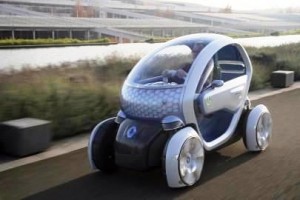Renault will manufacture starting in 2011 an electric vehicle (EV) based on Twizy Z.E. concept at Valladolid, 150 km north west of Madrid.
The company says the EV is compact, nimble and practical, and will “fully meet all sustainable urban mobility needs.”
Technical details were not released.
The Valladolid plant was selected for its expertise and performance in compact car production. It currently produces Modus and Grand Modus and a some Clio models. Spain is central to the intended sales markets in Western Europe, where makers are counting on large taxpayer subsidies to make expensive EVs affordable and desirable.
The latest move toward electrification follows closely an announcement that the Renault-Nissan Alliance, the French Atomic Energy Commission (CEA) and the French Strategic Investment Fund (FSI) are establishing a joint venture company that would develop and manufacture batteries for electric vehicles, with the approval of Christian Estrosi, the French Minister for Industry.
The U.S. is alone among major economic powers in lacking a formal government industrial policy organization to create jobs and nurture industries.
Electric cars in France might make sense under certain subsidized conditions because electricity there is generated from nuclear energy, which doesn’t produce carbon dioxide, a harmful greenhouse gas.
In the U.S., half of all electricity is produced from burning coal, a gross emitter of CO2, with most of the balance coming from other fossil fuels, which also results in the emission of carbon dioxide.
The new French joint venture will develop and manufacture batteries for electric vehicles in France. Batteries produced would also be available for sale to any manufacturer. It is not immediately clear that other major automakers would be interested, as most — if not all– of them are pursuing their own government subsidized battery joint ventures.
Renault, Nissan and the CEA would bring technical expertise and infrastructure support in addition to an unspecified equity investment. The investment value of the first phase of the project is estimated at €600 million.
The FSI will contribute €125 million (~$186 million) to the project. In order to complete the financing of the project, the European Investment Bank (EIB) is considering a loan of up to 50% of the €280 million (~$ 415 million)of the financing required.
The joint venture plans to produce batteries from mid 2012 at the Renault Flins plant, located 30 km from Paris. Production capacity is targeted at 100,000 batteries a year. The Renault-Nissan Alliance will use its European battery plants in France, the UK and Portugal to supply electric vehicles built around Europe and Turkey. Renault intends to use the batteries produced at Flins primarily for the all-new electric car that will derive from the Zoe Ze Concept, also to be built at the Flins plant.
To date, the French government has created several initiatives to promote EVs, including public and private sector company bids on the joint purchases of 100,000 electric vehicles by 2015; consumer incentives of up to €5,000 ($7,400) for the purchase of an electric vehicle (through 2012); and the development of infrastructure through a planned investment of €900 million Euros financed by the French government.
“Realizing the potential of zero-emission mobility on a mass scale requires unique collaboration between public and private sectors,” said Carlos Ghosn, Chairman and CEO of Renault and Nissan. We welcome the vision and commitment made today by the French government, the CEA and the FSI to invest with the Renault Nissan Alliance in the future of clean transportation.”
The Renault-Nissan Alliance has signed more than 30 agreements worldwide with partners to launch its first electric vehicle starting in 2010 and to mass market a full range of electrical vehicles in 2012.
Ghosn previously dismissed hybrid electric vehicles as too expensive and impractical. He is now pursuing a government-subsidized approach to electric vehicles.

